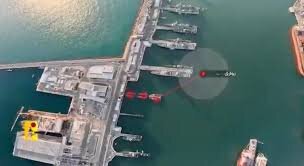‘Hoopoe’ drone video “extremely dangerous”
Israelis convey war threat to the Lebanese resistance movement

TEHRAN- Israeli media has described the drone surveillance footage released by Lebanon's Hezbollah as "extremely dangerous," saying that Israeli censorship prevented its circulation in Hebrew media and classified it as “disturbing".
The 9-minute video published by Hezbollah shows how a reconnaissance drone was able to capture footage and expose sensitive Israeli sites without being detected by the occupation regime's anti-air systems.
Israeli media reported that the drone entered Israeli regions and gathered important information about sensitive locations in the north. It filmed a series of sites such as Haifa port, the airport, military bases, the Rafael weapons factory, Kiryat Shmona Islands, iron domes, several residential neighborhoods, and commercial complexes.
Afterward, the drone returned safely to Lebanon.
Israeli media noted that Hezbollah conveyed a message through the video, responding to threats that if Israel takes action against Lebanon, the scope of Hezbollah's targets against Israel will not be small.
Israeli media pointed out that the Hezbollah video "clearly shows Haifa port, filmed mostly last Tuesday, from a Hezbollah drone."
Israeli media alluded to a false alert that was launched a week ago in the Haifa port area after an "interception operation" was conducted in the early hours of the morning, but the "false alert" has now been branded as a deception.
Reports highlighted that Hezbollah demonstrated the capability that surprised the "Israeli army" and security personnel, noting that viewers of the Hezbollah video can see many homes in Haifa "where we reside".
"Hezbollah, through its release of images of Haifa port, sent a threat to the port."
Other Israeli media outlets reported that "Hezbollah released aerial photos of important economic and military sensitive locations inside and near Haifa port, including photos of Sa'ar 4 and 5 missile ships," noting that "the new development is the most worrisome since the beginning of the war."
Hebrew news outlets also said, "Hezbollah published one of the toughest recordings in the war, not a video of dead or wounded, but a video revealing its intelligence capabilities."
The Hezbollah surveillance video included a full overview of the Israeli Rafael military-industrial complex, a massive military-industrial area for Rafael.
The footage included several factories, warehouses, and testing fields in which components of air systems are manufactured and assembled. The area is highly vital and sensitive. It occupies an area of around 6.5 km2 and is 24 km away from the Lebanese border.
Hezbollah's video also included an overview of Krayot, an Israeli suburb north of Haifa. It includes 6 towns and hosts around 260,000 Israeli settlers.
The video included the Haifa Bay area, a highly valuable economic and trade area that hosts massive military installations, industrial infrastructure, and commercial areas including the Haifa military base, the main naval base for the Israeli occupation forces - which is responsible for the northern naval front - Port of Haifa - the largest in the occupied territories - petrochemical facilities, oil silos, the Haifa power station and Haifa airport.
Touching on the timing of the video's release, Israeli media noted that it coincided with the U.S. mediator Amos Hochstein's trip to "Lebanon and Israel".
Israeli media reported that "Hezbollah listened well to the Israeli threats to Lebanon today through the U.S. envoy and chose to respond with a special video clip that explains if Israel takes a provocative step against Lebanon, the resistance movement is ready to strike back and inflict significant damage."
Hochstein is believed to have delivered a message from the Israelis. He is said to have conveyed a threat by the Israelis that Tel Aviv is seriously considering escalating the northern front with Hezbollah and that time is running out.
The American envoy met Israeli Prime Minister Benjamin Netanyahu and war minister Yoav Gallant on Monday before arriving in Lebanon, where he held talks with Nabih Berri, speaker of the Lebanese parliament.
Berri relayed the message to the Lebanese resistance group.
Hochstein returned to Tel Aviv with reports suggesting he informed Israeli officials that Hezbollah does not separate the fronts of Gaza with southern Lebanon and that Hezbollah will halt fire only when the Israelis do so in Gaza.
Hezbollah and the Israeli military have been exchanging fire since October 7.
Last week, the Lebanese resistance front escalated its attacks following the Israeli assassination of senior Hezbollah commander Abu Talib (Talib Sami Abdallah). According to experts, Hezbollah retaliated with a barrage of missiles and drones that amounted to 20% of the total projectiles the group has fired on Israeli sites since October 8.
It is not the first time the Israelis have threatened to wage war against Lebanon throughout the past eight months, giving Hezbollah ample time to prepare for such a scenario.
